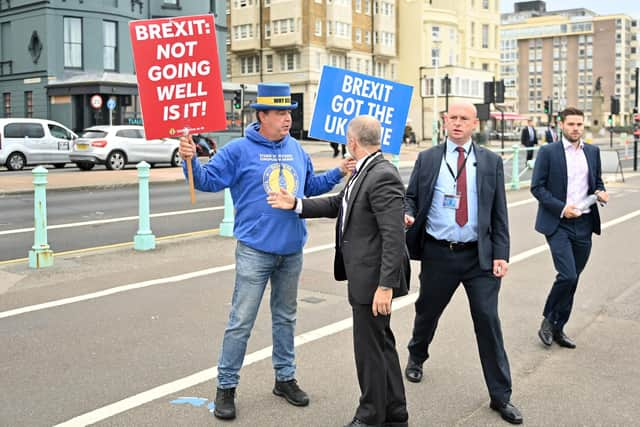Brexit: Labour's attitude to Europe is a growing problem for isolated UK – Stewart McDonald
It was billed as a speech “packed with policy”, and as befitting of a thoughtful politician like Lammy – who I hold in high regard – it was quick to make a correct diagnosis of a Britain “lost and disconnected” from the rest of the world after the morass of Brexit. Yet, in a broad but not particularly deep speech, he shied away from making decisive pronouncements on where Labour’s Britain should go.
Under a Labour government, not only will there be no opportunity for the reversal of Brexit, but there will also be no commonsense attempts to mitigate the ongoing damage by joining the Customs Union or Single Market, despite Lammy himself acknowledging that it undoes centuries of British strategy in leaving us isolated in our own continent. Labour’s “Britain, Reconnected” slogan has no more substance than Theresa May’s vacuous “Global Britain”.
Advertisement
Hide AdAdvertisement
Hide AdIn failing to change course on Brexit, Lammy opens Labour’s plan to two principle challenges: firstly, the idea that no one believes this new-found enthusiasm to ‘Make Brexit Work’ (it was after all Lammy who in a memorable 2019 speech called Brexit “a con, a trick, a swindle, a fraud, a deception that will hurt most of those people it promised to help”), and secondly in the way it fails to really get to grips with the challenges that the new geopolitical reality poses.
The poorer Britain in a changing world that Labour hopes to inherit will be less able to do all of the things that were put forward at Chatham House: inflation will stymie any plans to reverse the decline in our Armed Forces, just as it will make the delicate task of repairing alliances harder, and in a particularly glaring acknowledgement, make it uncertain if even a Starmer government will restore the 0.7 per cent overseas-aid pledge that was once a totem of how Labour saw itself in the world.
This confusion was summed up in the contention that Labour would maintain the importance of the ‘Indo-Pacific tilt’, an amorphous policy first outlined in the 2019 integrated review for which the UK is neither militarily nor economically prepared; yet this attempt to move away from reliance on Europe and the West could leave it increasingly “lost and disconnected” at a time when it should be seeking to build bridges.
While Lammy was right to name three trends shaping foreign policy – broadly, “geopolitical competition”, “weaponised interdependence”, and the blurring of foreign and domestic policy – there was no attempt to tackle what that meant for the UK should these trends continue.
Quite simply, not only has Brexit been a disaster, but it has also come at the wrong time in the geopolitical cycle, as deglobalisation hastens an end to the world that the Brexiteers wanted to take advantage of – a change neatly encapsulated in the bible of Washington international policy, Foreign Affairs, last year by the Financial Times’s associate editor, Rana Foroohar: “Globalization has crested and begun to recede. In its place, a more regionalized and even localized world. Faced with rising political discontent at home and geopolitical tensions abroad, governments and businesses alike are increasingly focused on resilience in addition to efficiency.”


Nowhere is this idea better encapsulated than in the landmark US Inflation Reduction Act, a bill passed last year that will, among other things, target $391 billion in spending on a clean-energy transition, with similar ambitions for bringing complex chip manufacturing back onshore, flexing American economic muscle in the pursuance of geopolitical strategy.
Europe has been jolted into action and is bringing together its own comprehensive plan to shape these future industries, with subsidies and incentives for companies and states within the European Union. Rishi Sunak has already sounded his alarm at the obvious potential for pipsqueak Britain to get crushed between these two tectonic plates, with whatever competitive advantage the UK had now fading into memory.
Of course, none of this is immaterial to Scotland – the blurring of these lines between foreign and domestic policy means that not only can immediate concerns around the cost of living and prices be traced back to these geopolitical changes, but so will the success of our own transition towards a sustainable future economy hinge on our ability to gain access to markets and subsidies that will have changed since the high water mark of globalisation.
Advertisement
Hide AdAdvertisement
Hide AdI found in my time as a front-bench spokesperson that it is not simply enough to define your foreign policy as about what you are against; you must seek to demonstrate what you are actually for. I moved along the SNPs foreign and defence policy onto more substantial ground, based on strong foundations, and didn’t shy away from inconvenient truths. After independence, one of these pillars will be a strong continuing relationship with the UK, alongside our membership of the European Union.
I was able to do this because I knew exactly where my party, and our voters were. Scotland’s First Minister can stand up and say that she unequivocally believes in the established European and western order – in the twin pillars of the European Union and Nato, and the importance of these alliances to our economic and military security.
Sir Keir Starmer and Labour can’t do this, and his attempt to triangulate the views of those who wish to ignore the realities of Brexit into a winning Labour coalition show the many ways in which the promises he has made to those who desperately wish to see him succeed are destined to fail. For while many will be taken in by the fact that he is not Jeremy Corbyn, Scotland and the rest of Britain need to know what he and his government would actually stand for.
Stewart McDonald is SNP MP for Glasgow South
Comments
Want to join the conversation? Please or to comment on this article.